|
|
|
Sort Order |
|
|
|
Items / Page
|
|
|
|
|
|
|
| Srl | Item |
| 1 |
ID:
120512


|
|
|
|
|
| Publication |
2013.
|
| Summary/Abstract |
In this article the extent to which political variables can explain the behaviour of constitutional judges in Italy when dealing with conflicts between the central government and regions is explored. Two competing hypotheses are tested. One hypothesis argues that one should expect some alignment between the political preferences of the judges and the success of the central government primarily due to the appointment mechanism. The other hypothesis suggests that there should be no systematic alignment between the political preferences of the judges and the success of the central government. Unlike previous literature, the empirical results presented in this article seem to confirm that when the Rapporteur and the court's majority are allegedly affiliated with the Prime Minister's coalition, the odds of success of the Prime Minister go up.
|
|
|
|
|
|
|
|
|
|
|
|
|
|
|
|
| 2 |
ID:
120507
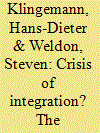

|
|
|
|
|
| Publication |
2013.
|
| Summary/Abstract |
The healthy functioning and long-term viability of the European Union (EU) ultimately depend on its citizens finding common cause and developing a shared sense of political community. However, in recent years, scholars and pundits alike have expressed doubts about whether the EU's growing cultural, religious and economic diversity is undermining the development of citizens' shared sense of political community, especially following eastern expansion. In this article, this question is examined using data on a key aspect of political community: transnational dyadic trust. Drawing on a unique set of opinion surveys from the formative years of the EU to the first wave of eastward expansion (1954-2004), the development and sources of dyadic trust among EU Member States is studied. While recognising the importance of diversity for trust judgments in the short-term, the prevailing viewpoint that it is also a long-term obstacle to integration is challenged. Instead, it is argued that citizens from diverse cultural and economic backgrounds can learn to trust one another and build a sense of political community over time through greater cooperation and interconnectedness. This theory is tested with data on bilateral trade density, which is seen as a proxy and precursor for other forms of cross-national interconnectedness. Employing longitudinal models, the article also goes beyond existing research to test the theories over time. The study makes a contribution to the research on European integration, suggesting that over time mutual trust and a shared sense of political community can indeed develop in diverse settings.
|
|
|
|
|
|
|
|
|
|
|
|
|
|
|
|
| 3 |
ID:
120510
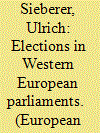

|
|
|
|
|
| Publication |
2013.
|
| Summary/Abstract |
Parliaments often elect holders of important extra-parliamentary offices such as heads of state, constitutional judges, heads of audit institutions and ombudsmen. What drives the behaviour of parliamentary actors and the outcome of such elections? This article explains actor behaviour theoretically, drawing on spatial factors, principal-agent arguments about the importance of nonspatial candidate characteristics and signaling arguments about competitive considerations beyond the specific election. Empirically, it provides the first comparative analysis of such elections outside the United States Senate using original data on 100 elections for four external offices in 14 Western European parliaments. The findings show that spatial variables, nonspatial candidate characteristics and features of the competitive context systematically affect the election outcome. The article contributes to comparative parliamentary research in general by demonstrating how parliamentary activities, other than lawmaking, can be analysed using established theories and by showing that consensual aggregate outcomes can be explained within a competition-based rational choice model.
|
|
|
|
|
|
|
|
|
|
|
|
|
|
|
|
| 4 |
ID:
120511
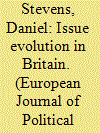

|
|
|
|
|
| Publication |
2013.
|
| Summary/Abstract |
While Carmines and Stimson's work on issue evolutions has prompted research showing the dynamics and effects of new party alignments on abortion, religion, gender and cultural issues, this research has all centred on the United States. This article examines issue evolution in Britain. Using evidence on the timing of changes in elite positions from Comparative Manifestos Group data, and survey data on public attitudes to the European Union with a longer historical sweep than heretofore, the article finds strong evidence that the European issue has followed an issue evolution path, though with distinct dynamics contingent on the pace of elite re-positioning. Thus, this article extends the theory of issue evolution to a parliamentary political system and demonstrates the responsiveness of the public to elite cues, while also providing additional insights from a unique case in which elites have staked out distinct positions not once, but twice.
|
|
|
|
|
|
|
|
|
|
|
|
|
|
|
|
| 5 |
ID:
120509
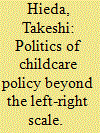

|
|
|
|
|
| Publication |
2013.
|
| Summary/Abstract |
Childcare policy has become an integral part of social and economic policy in post-industrial democracies. This article explores how the transformation of party systems structures the politics of childcare policy. It reveals that political parties contend with each other over childcare and female employment policy on the social-value dimension as well as the redistributive dimension. Assuming that different party policies have distinct impacts on public childcare policy, it is hypothesised in this article that a government's policy position - composed of the governing parties' policy positions - affects changes in public spending for childcare services. Through an analysis of the pooled time-series and cross-section data of 18 advanced industrialised countries from 1980 until 2005 using multivariate regression methods, it is revealed that a government's redistributive left-right policy position interacts with its social liberal-conservative policy position, and that a left-liberal government raises its budget for childcare services while a left-conservative government does not.
|
|
|
|
|
|
|
|
|
|
|
|
|
|
|
|
| 6 |
ID:
120506
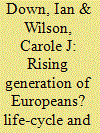

|
|
|
|
|
| Publication |
2013.
|
| Summary/Abstract |
Despite much research on age and attitudes, it remains unclear whether age reflects accumulated life experience or conditions prevailing during an individual's formative years - that is, a life-cycle effect or a cohort effect. In respect to attitudes towards the European Union (EU), the issue is particularly important. Although many analyses indicate a correlation between age and support, the relationship has not been adequately theorised and extant analyses have generated contradictory results. In this article, theoretical expectations for both life-cycle and cohort effects on support for the EU are developed and tested using a cross random effects model. This not only identifies the nature of an age-support relationship, but also highlights substantial generational differences in attitudes towards European integration and explains the inconsistencies in extant empirical analyses.
|
|
|
|
|
|
|
|
|
|
|
|
|
|
|
|
|
|
|
|
|